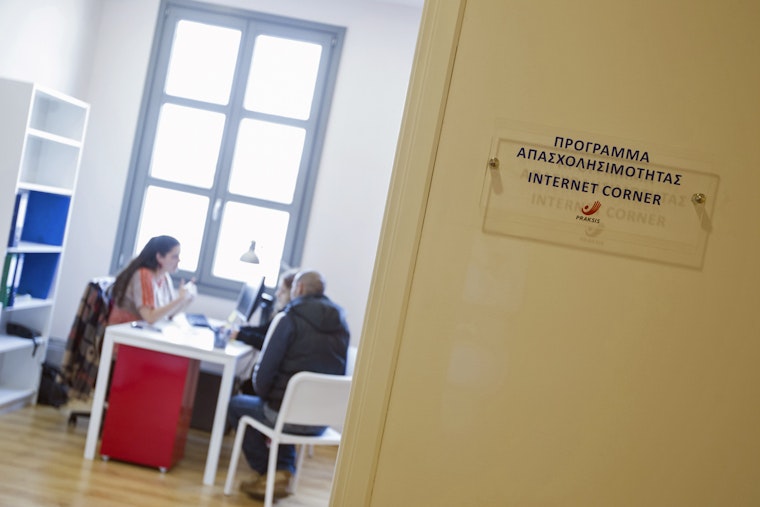Amid Economic Turmoil, Athens Builds a Space for Civic Solidarity
By Antonia Zafeiri

The Open Society Foundations established Solidarity Now in Greece in 2013 to support those affected by the economic crisis. Today, as the group’s network expands, a new Solidarity Center is preparing to open in Athens. We spoke to Managing Director Epaminondas Farmakis about the new center and his vision for a society built on unity and collaboration.
Greece is entering its eighth year of recession. How has this affected the social fabric in Greece and what challenges lie ahead?
The financial crisis and its aftermath have undoubtedly affected all aspects of Greek society—social, economic, and political. The social welfare state continues to shrink, leaving citizens without a safety net and with very low living standards compared to other OECD countries. In January, according to recent Eurostat metrics, the unemployment rate reached 25.8 percent; among youth under 25 it was 50.6 percent.
Migration is an alarming issue for the country, as Greece is one of the main entry routes for migrants fleeing their countries to seek a better life in Europe. We have seen the growing popularity of extremist parties that capitalize on nationalism and xenophobia.
We are facing a humanitarian emergency and the only way out is if we fight it together. The goal of Solidarity Now is to cultivate this unity, in part with its Solidarity Centers.
The Greek state has reduced or cut support to vulnerable populations, leaving civil society to shoulder more of the burden. In this environment, what is the role of Solidarity Now and its partners?
Today in Greece the role of civil society as a whole, and Solidarity Now and its partners in particular, is a critical one. It’s a very heavy burden, but we are determined to do all we can to respond.
By definition, solidarity means mutual support within a group of individuals that share a common goal or interest. This was the inspiration behind the establishment of Solidarity Now two years ago by the Open Society Foundations, and it remains our purpose today. We hope that through our network we can respond to the consequences of the crisis and send a message of unity and solidarity to others across Europe who want to be part of this movement.
By providing support for people who face hardship and exclusion in Greece, we do not want to promote solidarity only among Greek citizens in our country, but encourage solidarity among European citizens at large and all European nations.
The Solidarity Center in Thessaloniki has been operating for more than a year. Now the network is expanding, and you are inaugurating a new center in Athens. What has been achieved in Thessaloniki? What will the Solidarity Center in Athens offer?
Both centers are hubs where many organizations cohesively work together to address a number of social and economic problems. For example, we work with a number of nongovernmental organizations to offer free primary health care, free legal advice, children and family support, employment skills training, and referrals to social services for anyone in need.
Ever since its establishment in January 2014, the Solidarity Center in Thessaloniki has already become an active part of the city, supporting all citizens regardless of their nationality, origins, or social status.
Notably we have already had more than 2,500 visits for medical cases and more than 1,100 legal aid cases. In Thessaloniki we hit many milestones in a short period of time, and we are confident that the Athens center will be just as groundbreaking.
Our main service areas include humanitarian aid, the protection of basic human rights, and the protection of the rights and interests of various vulnerable populations (such as the Roma). Through these collective works, we aim to advance social responsibility in the context of democracy, and advance the reach and the abilities of the center’s partner NGOs in achieving their individual and collective missions.
How will the center in Athens complement the rest of Solidarity Now’s work in Greece?
The center is a gathering place for all citizens regardless of their nationality, origins, or social standing. Similarly, the four NGOs working under the Athens center’s umbrella—ARSIS, PRAKSIS, the Network for Children’s Rights, and Together for Children—offer their community services freely to all who need and seek them. These services include health care, legal aid, job search assistance, child day care services, and support for vulnerable groups including the elderly, those needing medical assistance, migrants, and asylum seekers.
Apart from the two Solidarity Centers, Solidarity Now runs a number of other programs designed to support those in need and promote social cohesion—mainly in the fields of relief, employability, and respect for diversity. For example, with a recent initiative we were able to support dozens of unemployed people find jobs in the midst of the crisis by connecting them to potential employers and also to provide microfinance to those who had the potential to develop their own business ideas.
This is the basis of Solidarity Now’s entire collective work in Greece—growing a network of solidarity. We believe that we all have an important role to play and that we all can and should work together to contribute and advance the creation of a better society—one that includes the implementation of the word “solidarity” in the lives of all people, not just in Greece but in the whole of Europe.
Until April 2016, Antonia Zafeiri was a European communications officer at the Open Society Foundations.
